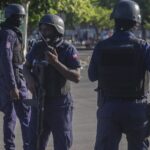We are unsurprised at the disclosure by one of the island’s leading experts in the fight against youth crime that the COVID-19 pandemic conditions may have been fertile breeding ground for what the country is currently experiencing.
Mrs Cheryl Willoughby, director of the Criminal Justice Research and Planning Unit was fairly emphatic in her submission this week that the pandemic has led to a significant increase in youth crime, with the lack of educational support during the many lockdowns and disruptions to education and other important social services.
The subsequent virtual classrooms that were established may have worked for those with the financial means and support systems to continue their education, but even those students faced some level of trauma as a result of sudden changes in education delivery.
Willoughby is by no means a neophyte in this business. She has been deep in the trenches of the battle for a very long time, going back to her years as a vocal advocate in the Police Service’s Juvenile Liaison Scheme.
From her position in law enforcement for 15 years, she would have encountered many youngsters who were successfully diverted from a life of crime through the programme, while others would harden in their ways.
The Criminal Justice Research and Planning Unit director’s credibility is also reinforced by her near decade of work with the National Council on Substance Abuse.
As she participated this week in the launch of the National Peace Programme’s Livewise Campaign, the technocrat highlighted that pandemic conditions had disproportionately affected young men ages 16 to 18, who were now increasingly involved in serious criminal activities such as the commission of murder, robbery and gun related offences.
Mrs Willoughby argued that the mostly young men finding themselves as offenders in the local justice system had not benefited from “critical support structures, exacerbating vulnerabilities that have now manifested in higher crime rates”.
In her submission, she posited : “When we examine the data, we recognise that these young people are the ones who did not benefit really from serious sound education during the COVID period.
“When you go back four years, you’ll recognise that was the time when Barbados literally shut down.”
As a nation, Barbados was not in the dark about the social issues that would develop from the pandemic, and the need to address them with urgency.
The United Nations Educational, Scientific and Cultural Organisation (UNESCO) has been alerting the world of the pandemic’s impact beyond the health concerns.
Governments were rightly consumed with preventing death and the spread of illness, however, there is an admission now that the singular focus on people’s physical health came at the expense of their mental health and social needs.
In a study, titled “The urgency of educational recovery in Latin America and the Caribbean“, UNESCO warned that if countries did not adopt a systematic and comprehensive response, the consequences of the crisis will affect the learning of students in the region for many years.
The data in the UNESCO study aligns with what we are hearing from Mrs Willoughby, as it revealed that during the pandemic, there was a significant drop in attendance rates at all educational levels, especially in 2020.
Circle back to what is happening at the Grantley Adams Memorial School where students have not benefited from in-person classes for almost an entire term, due to yet undisclosed environmental issues.
Such a scenario, given all that the country has been told about disruptions to education of the country’s children and the long-term impact, what has occurred at the St Joseph-based secondary school paints a highly distressing picture.
The international agencies and local experts are telling the same story – this will not end well for the students, who are already disadvantaged due to societal prejudices against schools where the majority of children enter with low common entrance examination grades.
Some parents have taken their disgust with the situation to the media; however, it is for the Ministry of Education and the stakeholders to understand that the ill-effects of these circumstances may not be felt now but will certainly emerge at a later date.
Quality education has been affirmed as No 4 on the UN’s Sustainable Development Goals. Can Barbadians feel comfortable projecting that the country has adequately attained this goal, when hundreds of children in one institution have not received the same level and the quality of education that others across the country have received, over such an extended period?
The post Link between education, crime evident appeared first on Barbados Today.


